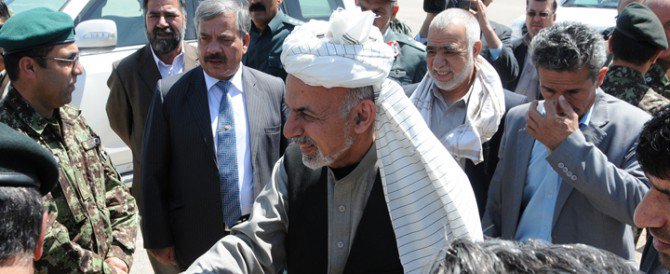Dr Ashraf Ghani Ahmadzai’s inauguration on September 29 as the new president of Afghanistan brings to an end months of deadlock over elections that were deeply tainted with fraud. He will face enormous challenges, not least in fulfilling the pledges he has made to fight corruption and enforce the rule of law. But there are positive signs that at least that battle will be fought more seriously.

Ghani has made a major point of his anti-corruption credentials. As Finance Minister from 2002 to 2004 he helped boost government income from customs, most of which was being stolen by armed groups. His background before this was as a technocrat at the World Bank.
From conversations I’ve had with a range of Afghans since the beginning of this year, the verdict is almost universal: Ghani is seen as personally honest – notwithstanding doubts over some of his votes.
He has said many of the right things as well. In his inauguration address he vowed to fight abuses and urged the judiciary not to hesitate to prosecute his relatives if they were involved in corruption. And he does not exclude himself from this sentiment. “We want to be held accountable,” Ghani said, “I am your leader but I am no better than you. If I make mistakes, you should hold me accountable.”
That statement was an explicit echo of the words of Abu Bakr Sediq when he was chosen as the first Caliph (spiritual and political leader) of Islam in 632 AD. Ghani could have quoted him in more depth. Abu Bakr went on to say that: “The weak amongst you shall be strong with me until I have secured his rights, if God wills; and the strong amongst you shall be weak with me until I have wrested from him the rights of others.” That is a pretty good summary of the task that the new president faces in strengthening the rule of law.
In an interview a few days ago, Ghani was even more explicit. He said he believed he could lift Afghanistan 100 places in the Transparency International corruption index, which currently ranks the country as the third most corrupt in the world. He insisted: “I am not corrupt and I am not going to encourage corruption, tolerate it or become the instrument.”
The question, of course, is whether he can deliver. His inauguration comes on the back of a deal with Dr Abdullah Abdullah which will see them share responsibility for making government appointments. Dr Abdullah has made similarly positive statements on corruption, but both men owe much to their backers, many of whom will see control over government posts as an opportunity to make money. Resisting that pressure, without destabilising the country, will require huge effort.
The underlying challenge is enormous. For example, Ghani has also spoken about the huge potential for mining in Afghanistan, and especially its ability to be a Saudi Arabia of rare earths and minerals, such as lithium. But at present mining contributes less than 3 per cent of the Afghan budget – largely because of corruption and insecurity.
Fixing that will require putting in place much stronger measures for transparency and accountability – like publication of beneficial ownership and model contracts – as well as robust action against strongmen and armed groups benefitting from the minerals trade. But that will be hard to achieve without compromising the interests of powerful figures in Afghan politics.
Still, at least Ghani seems up for the challenge. “The job is attractive precisely because it looks impossible,” he said in his pre-inauguration interview. Given the scale of the task ahead of him, this is probably just the spirit Afghanistan’s new president needs.
[Photo: Flickr/isafmedia: Dr. Ashraf Ghani Ahmadzai, Chairman of the Islamic Republic of Afghanistan Transition Coordination Commission, arrives at Forward Operating Base Farah, Farah province, Afghanistan on May 3. Ghani is visiting Farah to meet with provincial leadership. (U.S. Navy photo by Lt. Benjamin Addison)]